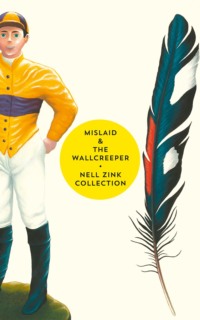
Полная версия
Mislaid
“That can be taken care of,” Lee said.
“No, I mean it,” she said. “This is a big deal. You have to promise me.”
“I promise you everything.” He kissed her. “Everything.”
He was mystified that he would say something like that to anyone—male, female, eunuch, hermaphrodite, sheep, tree. He looked her in the eyes and decided she wasn’t paying attention.
He landed the canoe and carried her into the house.
Peggy was young and her patience for sexual activity was just about infinite. Her sex drive was strong, plus pent up, since she’d been looking at girls and thinking about fucking them for five solid years. And Lee was no slouch either. Between his teaching only three courses and her willingness to skip class, they found a lot of time to inhabit his conversation pit as well as the bed that hung on brass chains from the ceiling and the Bengal tiger skin. Sometimes they talked, and sometimes he just sat and typed while she went through the bookshelves, reading Genet and Huysmans but mostly thinking about what she thought about all the time now: sex with Lee. She was feeling new feelings, emotional and physical, new pains and longings, and she couldn’t make notes—there was no point; there was no way you could work them into a play, and somebody might find them and read them—but she kept careful track of them, mentally.
Being a lesbian had given her practice keeping secrets. She walked to his house through the woods even when it took her two hours. Or she waited by the road for his car. Moonless nights in Stillwater were dark as the inside of a cow. When he didn’t have time to see her, she would sit on a bench overlooking the lake and stare at his bamboo.
Lee had promised Peggy everything, but he hadn’t thought to include a promise that she wouldn’t be kicked out of school for fraternization. Lee sleeping with a student was a scandal, and it had to be stopped. Lee was in loco parentis, but he was also indispensable. Thus Peggy was deemed to have found her calling. Girls quit coed schools to get married all the time. That’s what they go there for—to get their MRS degree. Stillwater was supposed to be different, but any school could let in the wrong girl. They asked her not to come back after Christmas vacation.
It was a difficult discussion with her mother. Peggy thought she was bringing good news. Not a lesbian. Shacking up with a famous poet. Quitting that third-rate college. Her life was back on track. Right?
Her mother shook her head with red-rimmed eyes. “I knew you would regret choosing to be a lesbian. But you are making the wrong choice, honey. I wanted you to get an education. Now you’re seventeen and there’s nothing I can do.”
Her father said, “You’re saving me a bundle, you know that? You’re Lee Fleming’s problem now, and I wish him luck.”
“How am I Lee’s problem? I’m going to transfer to another school! I applied to the New School for Social Research!”
Her father rolled his eyes. To him it was a cruel joke being played on him by his supervisor God. A social superior with an intellectual bent and a fortune in land: he had prayed many times for a husband like that for Peggy.
Peggy’s mother’s parting gift was a trip to the gynecologist. Peggy had never seen a gynecologist before and didn’t like it. He was supposed to fit her with a diaphragm. Instead he took one look at her cervix and said, “Miss Vaillaincourt, you are fixing to have a baby and I would say it’s not going to take so long that you shouldn’t get married at the earliest possible opportunity.” She said she didn’t want a baby, and he repeated the sentence word for word with the same exact identical intonation, like a machine.
Lee saw it coming. She came back from Christmas vacation looking bloated. He reflected that he had fucked her nearly every day since September. He asked, “Punky, don’t you ever get the curse?” She broke down and begged him for a Mexican abortion. “Why would you do that?” he said. “I’d give my child a name.” She stared in horror like he was a giant spider, then clasped her fists against her abdomen and moaned like a cow. “Are you feeling sick? That’s all right, it’s normal.”
He hadn’t anticipated having a wedding at all, ever, but he felt up to the task. Fatherhood surprised him pleasantly. As a male he assumed no unpleasant duties would accrue to him. He would be responsible for teaching the child conversational skills once it reached its teens.
It was up to Peggy’s parents to pay for the wedding. Peggy got as far as asking them. Her mother called her Lee’s doxy and said the baby would be born deformed because Flemings marry their cousins. Her father gave her five hundred dollars and sighed.
Lee consulted his old friend Cary. They had grown up as neighbors. Cary was older and richer and fey, with a hobby of arranging flowers and a habit of getting into difficult situations with straight men. They made a date at a gay bar under a hardware store in Portsmouth.
“Urbanna is the place for a wedding,” Cary said. “Rent the beach and I’ll organize us some swan boats. They’ve got the whitest sand beach in Tidewater, and we’ll jam Christ Church full of magnolias until it goes pop.”
“Swan boats? What are you, drunk?”
Cary folded his arms and said, “Then get married in Battle Abbey with a reception in the yard. See if I care.”
“Swan boats would drift out to the river. They have wings like sails, and no keel.”
“You want the swan boats.” Cary pointed at him and announced the news to the empty bar. “Fleming wants the swan boats!”
“I want an honor guard from VMI, but that doesn’t mean I’m going to get it. What I need is for three hundred people to know my beautiful bride is with child, and then clear out while we go on our honeymoon, and for that I need—what do I need, man? I’m asking you. You think I do this all the time?”
“Bruton Parish Church. Then those of us of the non-marrying persuasion retire to the Williamsburg Inn for mint ‘giblets,’ and you drive down to Hatteras with what’s-her-name.”
“Peggy.”
“Then you take the Peglet down to Nags Head and get her pregnant again.”
“She’s pregnant now. There’s no double pregnant.”
“Then you lay back and watch her get fatter.”
“It’s not fat. It’s a Fleming. And we’re going to Charleston.”
“In January?”
“Spring break.”
“She’s going to be fat as a tick by March. Big old body, little arms and legs.”
The door of the Cockpit flew open and four sailors came in, pushing and shoving their way down the narrow stairway. Lee immediately turned to face them and Cary tugged on his arm. “Whoa, Nelly. You’re a married man.”
“I got a right to a bachelor party, ain’t I?”
Lee wrote a poem with swan boats in it to get them out of his system, and addressed himself to the fact that he had gotten Peggy out of his system. The easy joy and the joyful ease of sex with men, their easy-access genitalia, their uncomplicated inner lives … He knew there were women who lived like that, even beautiful and very interesting women, but they didn’t appeal to him at all. He wanted the needy staring beforehand and the tears of worshipful gratitude afterward, as though every orgasm were a reprieve from a death sentence. He just didn’t want it all the time.
He had had as much sex with Peggy as a person can have, and that was enough. She was hanging around his house doing her best to keep out of his way, like she was afraid of him. She felt nauseated, existentially and otherwise. She didn’t want to get on his nerves. She felt dependent. And she was. She was depending on him to do an awful lot of things, like marry her, raise her child, send her to school in New York, and finance the rest of her existence until the day she died. She had a suspicion it might not work out that way.
He, too, knew he wouldn’t be sending her away to finish school. But he knew the real reason: The college paid him two thousand dollars a year, and that was the extent of his income. He didn’t have a trust fund, just the prospect of inheriting from a happy-go-lucky fifty-four-year-old father who was more likely to die skiing than get sick before he turned eighty. It was no coincidence that famous authors came to visit him and not the other way around, or that he served his guests spaghetti. But quand même. The best things in life are free. A round of billiards with sailors is more beautiful than Charleston in springtime, if they’re the right sailors.
Peggy began writing a play. She got as far as the names after “DRAMATIS PERSONAE.” She wanted to draw on Arthurian mythology, the Questing Beast and the Fisher King, and got stuck on Guinevere. She imagined Joan Baez, without the shrill voice and the guitar, arms out like the Virgin of Guadalupe, and there wasn’t much Arthurian about it. It was Mexican. She thought a lot about Mexico in those days. The freedom down there, the eternal springtime, women scampering across desert hillsides like roadrunners. February was so cold that Stillwater Lake froze solid and her former classmates began sliding over and peeking up at the house through the gap in the bamboo. Emily actually walked up on the back porch and opened the storm door and knocked hard, five times. But without taking off her skates, and she was gone like a shot. Then it thawed and Peggy was alone again.
For a lesbian, Lee’s house was cold turkey. You could go months without seeing a woman. Not that it mattered if your plan of being a pencil-thin seductress in black had unexpectedly given way to frying pancakes in a plaid bathrobe. She liked it best when there were visiting poets. They never minded if you sat near them and just listened to them talk. It was impossible to think of anything to say that might interest them, because they weren’t interested in conversations with topics. They went out of their way to generate non sequiturs, occasionally playing a game they called Exquisite Corpse where you string together stories not even knowing what they’re about. One of them brought along a Ouija board and let spirits write his poems. He would have let even Peggy write his poems if Lee hadn’t looked at her and frowned.
At first she wondered why they were all so rich. When one of them forgot his watch or left a cashmere sweater balled up in the corner of a sofa, he would never call to ask about it. Lee explained to her that art for art’s sake is an upper-class aesthetic. To create art divorced from any purpose, you can’t be living a life driven by need and desire. She wanted to write plays that would blow people’s minds, but he didn’t want anything. His poems just were, and that’s what made them so good and her plays bad.
Peggy thought about the poets’ ability to fund their own publications and wasn’t so sure. Lee had a friend with a printing press—not Linotype or the new offset kind, but movable type made of lead—and with it he could make anything Lee wrote look valuable. And the Stillwater Review could turn anything into poetry just by publishing it, even forty-one reiterations of “c*nt” arranged in the shape of the Empire State Building. “Poets were not put here to put labels on the world,” he explained to her. “If that poem is about anything, it’s about the act of reading. To cite it for obscenity, you’d have to say what it means, which is why I can publish it.”
“I don’t like it,” she said. “It turns cunts into a penis.”
“Cunts were made for penises. What you do with yours is your business, but those are the facts. Nothing else was ever made for penises. Never slowed me down. It’s a free country.” He lit up a Tareyton and blew a smoke ring that nearly crossed the room.
Peggy was inexperienced, but a feeling of unease told her things were not necessarily going to end well.
The spring was a little warmer than usual. By April you could drink and bullshit with poets around the fire all night. She had thought poets were different, but by then she knew they just bullshit like good old boys everywhere. You could take winos off the sidewalk in front of the drugstore and teach them to be poets in half an hour. They’d refuse, or maybe the ones who were closet homosexuals would say yes, but they all could have done it, and better than college girls, because college girls have inhibitions to get over. The people who talked revolution made out like if you just overcame whatever was holding you back inside, you’d be free. But you’d just be a wino in front of a drugstore, saying whatever came into your head in the most provocative way you could think of, repeating and refining it because how else were you going to kill a hundred and fifty thousand hours until your father died in a crash. The poets reminded her of barflies, in love with their own wisecracks, stiffing the bartender because they don’t know what work is. But freedom isn’t speaking your mind freely. Freedom is having the money to go to Mexico.
“Jesus, Peggy. You can’t abort a seven-month baby. That’s infanticide. You need to get your daddy down here with a shotgun, because I keep on forgetting to marry you. And I do want to marry you.”
“So marry me now.” Peggy had heard of alimony. She wasn’t sure how much you get and if it’s enough to live on, but it had to be better than being an unwed teenage mother. She was barely eighteen and wouldn’t be grown up for three more years. They could have put her in a home for wayward girls.
“Dare me,” Lee said.
“I double-dare you with whipped cream and a cherry on top.”
He called a magistrate and arranged to be married the next afternoon for fifteen dollars.
Two
When she had the baby, she couldn’t believe how beautiful he was. Rhys! She picked the name out all by herself. Labor was easy, no worse than cramps, which always made her feel like she was giving birth to a calf, then five hours in the hospital and there he was. He lay on a little cart, wrapped up in blue blankets, while she drank juice. Lee’s mother picked him up and said, “Welcome to the world, little Harry!”
“What are you doing, Mrs. Fleming?” Peggy said. “Give me my baby.”
“You didn’t really want this baby, did you now. Not from what I hear.”
“Lee!” she yelled. “Lee!”
Lee came in from the hallway. “Yes, dear? Well, would you look at that. My lord. What a sweetheart. Just look at him. Aw. Cleans up real nice.”
“His name is Rhys,” Peggy said. “Rhys Byrd Fleming. Do you like it?”
“But we’re christening him Harry,” Lee’s mother said.
“Moms, drop it. This is my wife. I’m his father. This not y’all’s baby. This my baby! Yes, sir! Who’s my baby!” He took Rhys and kissed him on the cheek, then leaned down and kissed Peggy.
“Well, we’ll be happy to help take care of him, if you need any help,” Lee’s mother said.
“You know what,” Peggy said, “I think it’s time I tried feeding him. Could we have a little time alone?”
“Yes, could you weigh anchor, darling?” Lee said.
“I’ll go fix you some formula,” his mother said, looking around for supplies. “Don’t tell me you’re going to—no. I refuse to believe it.”
“It’s the natural way,” Peggy said. “It’s good for him.”
“You’ll be tied to that baby like a ball and chain. You can’t let him out of your sight and no one can help you with him. No self-respecting woman does that. It’s like turning yourself into an animal.”
“I got news for you, lady. Guess where he came from.”
“Don’t get all in a snit,” Lee said.
“But that’s exactly it,” his mother said. “You don’t know the chemical composition. There could be anything in there. It’s unscientific.”
“Science gave us the bomb and DDT,” Peggy said.
“Moms,” Lee said, pushing his mother toward the door, “please just let us handle this. It will be fine. It will be right as rain. Little Rhys Byrd here is a Fleming. If anybody can survive mother’s milk, he can. She’s just, I don’t know,” he said, turning to Peggy as he looked for a word, “anxious. It’s her first grandchild.”
“She sure acts like an expert.”
“Well, she raised me. That’s what makes me think anyone can do it.”
There was no circumcision. Lee said circumcision was dreamed up by moralists and lotion salesmen to make hand jobs chafe, and Peggy deferred to his better judgment.
She settled in with baby Byrdie. She did all the housework. She did more laundry than had ever been done before at Lee’s house, and by September you could see exactly where on the front lawn the septic system was, traced out in darker bluegrass.
She couldn’t fit into the clothes she’d bought for school, so she wore Lee’s polo shirts. She seldom got around to washing her hair, and it seemed to be coming uncurled. Her breasts were heavy and sore. But she felt that the thing that was terribly wrong with her would soon be all right. The thing that was wrong with her was so right about Lee and Byrdie that she figured it didn’t matter. They were in perfect health and looked like they belonged in magazine advertisements for shirts and baby food, respectively. She looked like their maintenance man.
Lee had visitors who sat by the fire and bullshitted until long after Peggy fell asleep. She didn’t know what they did after she went to bed, but she didn’t care. She was as exhausted every night as if she’d played five hours of flag football. By the time Byrdie was eight months old, he was moving around so fast she was having to chase him. You couldn’t have gates and childproofing in a house like that. There were a million things he could have killed himself on. Landings with loose rugs, big glass vases done up as lamps. Peggy spent most of her time upstairs in the playroom, keeping him cleaned and fed. She was made to bring out the baby and accept praise for her work as if she were a being of a slightly lower social class—which she was. A woman. Even if they hadn’t all been gay men and thus more or less not interested in her at all, almost blind to her existence; even if they had been models of chivalry, rushing to pick up things she dropped and giving her flowers, instead of bullshitting parasites who thought they had invented crass vulgarity before inventing maudlin sentimentality as a foil (exposure to them was making Peggy at once articulate and sullen), a monosyllabic high school graduate in an oversized polo shirt with baby food on it was not going to get their attention. She couldn’t pose around in pedal pushers and offer them cigarillos and sangria. She had given up smoking and drinking, and she didn’t think she was obliged to wear party clothes any more than a bathing suit and goggles. Mothering was a different activity. Everything in its proper time and place. When Byrdie was three, she would put him in nursery school and drive to New York to get her degree. She was purposely vague with herself about the exact details of what kind of nursery school takes kids for a semester at a time, but she was sure it would work out.
By the time Byrdie was two, Peggy had begun to forget why she first came to Stillwater. She thought of it simply as “the college” where she was a faculty wife, a fine and worthy social position. Pushing him in a shopping cart through the aisles at the Safeway, she felt that the other housewives looked at her with respect. Her social position at Safeway was better than it was at home. Strangers called her “Mrs. Fleming,” as though she wore a name tag.
On one occasion when she was feeling edgy and exhausted and her cartilage ached the way it sometimes did, she stopped off at the memorial park on her way home. It was the biggest public open space in the county. She drove up and down the long rows of granite grave markers set flush to the grass singing, “If you are going to San Francisco,” thinking about smothering Byrdie and taking the car and just running away. Her life could start over as it was meant to start—but how was that, pray tell? As a lesbian? What about those two or three months of fixation on sleeping with Lee? Is that what lesbians do? She looked back at Byrdie asleep on the back bench seat and said, “Byrdie boy, I love you so much.”
On the next occasion when she was feeling down and nasty, she drove to the state beach and sat on the sand with Byrdie for almost an hour, digging in the grit by her feet with a little piece of crab shell. She walked him along the waterline to look for fossil shark teeth. They found tin can lids and a lucky penny. The sky was clouding up. She did some shopping, drove home, parked next to a strange car, and walked right into a scene she had not expected: Lee and Emily, using the hanging bed from India.
“Fuck, Lee!” she screamed. He laughed and didn’t allow himself to be distracted. The baby was still in the car—a baby, unlike milk, won’t spoil in the heat—so she walked right back out of the house, got in the car, and drove to the college, thinking she didn’t know what. She wanted to rat him out. It had to be against college policy, a professor making one student after marrying a different student! She drove the loop road, looking for a familiar face, and pulled up in front of her old dorm and cried.
For Peggy it was a life of work, mostly. Occasionally she got creative. She made cuttings of the lilacs and forsythia at the college, rooted them in water, and stuck them out in rows around the edge of the yard.
Sometimes Lee got invited to give readings. As he explained, he wouldn’t have any time at all to devote to her at these other colleges in strange cities. Poets and professors would want to have late dinners with him, after his readings, and then they would probably stay up drinking until all hours. The compatibility with Byrdie’s habits was nil. The plane tickets were only for Lee. He didn’t have the money. A reading is not a business trip. It’s nonstop socializing. She was his wife, not an appendage.
She went along once, to a literary festival half an hour away at VCU. It was as bleak as he said. Byrdie had no patience for up-and-coming writers. Poetry made him throw toys that clattered on the linoleum. Too big for a stroller, he couldn’t be rolled captive around the business district. She ended up watching him play in a dry fountain, longing for home.
Lee felt that vacations were a chance for her to see her family, and that it would be ridiculous to go on expensive trips when you live in a country place so pretty that famous poets leave New York and Boston to spend entire weeks there. So their first real excursion as a family took them up to Westmoreland County, where Lee’s brother, Trip, had a place on the Potomac. For such a rich man, it was an awfully rustic house, built as a hunting lodge when men used to rough it. The woods were full of snags that were still allowing huge grubs to mature and reproduce, so that if you left the light on in the outdoor shower, you would find things sitting on the bar of soap in the morning that looked like they were from the Precambrian. Luna moths thudded against the screen like birds, trying to get at the porch light. Hemlock groves towered over wild myrtles and rhododendrons. Every sunny spot had its snake, black or green or copperhead. It was beautiful, creepy, threatening.
You couldn’t swim in the river, because the jellyfish were swarming, so Trip took his houseguests to Stratford Hall, the birthplace of Robert E. Lee. First he showed them the house in Pevsner’s book on architecture and emphasized its beauty and significance. After lunching at the restaurant they toured the estate, Peggy’s sidelong glance catching Lee’s reverential look when presented with the cradle in which the infant Robert E. had been laid after his birth. Lee was only eight years older than her, but at times like that, she felt you could really tell.
The tour concluded with a visit to the kitchen, where the white tour guide took a plate of gingersnaps from a silent black woman who never raised her head. The tour guide passed them out, giving Byrdie four cookies while everyone else got one.
When the plate was empty the black woman, whose nappy hair was greased back awkwardly and who seemed somehow a cripple or a hunchback although she was neither and had a pretty, tender face, rose again from her stool in the corner and carried the empty plate into another room.
Byrdie stared. He had never seen anyone like her. She was not an adult. Or was she? She wore a uniform or costume—a calico dress. “Is the colored lady a slave?” he asked Lee.





